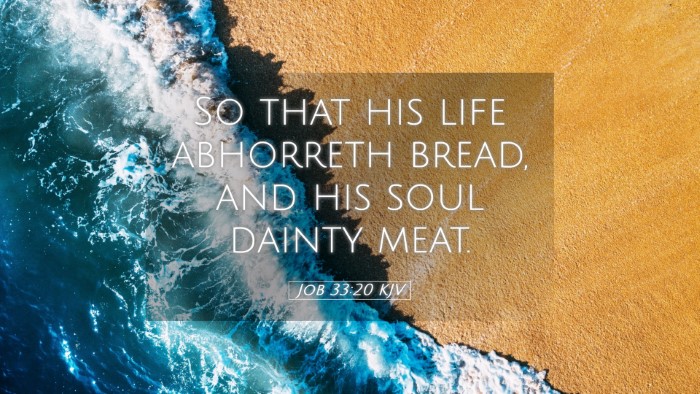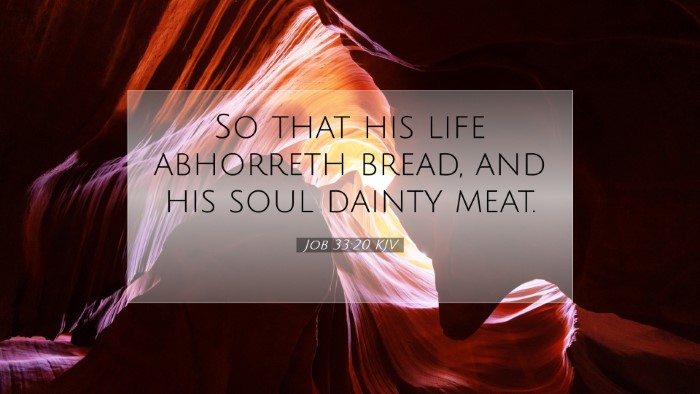Commentary on Job 33:20
Verse: Job 33:20 - "So that his life abhorreth bread, and his soul dainty meat."
Introduction
This verse presents an insight into the human condition, specifically relating to suffering and the state of the soul amidst profound distress. In the larger context of Job, Elihu speaks about God’s communication and the ways through which He reaches the hearts of men, often through suffering and anguish.
Contextual Background
The Book of Job is one of the most profound texts in the wisdom literature of the Old Testament, addressing the issues of suffering, divine justice, and human integrity. Job's plight triggers discussions on the nature and purpose of suffering, both from his friends and from Elihu, who introduces a different perspective. Job 33 highlights God's providence in the midst of human suffering.
Insights from Public Domain Commentaries
Matthew Henry's Commentary
Matthew Henry describes this verse as a depiction of the overwhelming despair that can consume a person in distress. He emphasizes how physical needs, represented by "bread" and "dainty meat," become insignificant in the throes of great sorrow. Henry comments on the various kinds of distress and their spiritual implications, noting that such states often lead individuals to a detachment from earthly pleasures and a deeper contemplation of their spiritual state.
- The Nature of Suffering: Henry illustrates that suffering can lead to a person having an "abhorrence" for sustenance. The suffering individual may feel that life’s joys have become devoid of meaning.
- Spiritual Reflection: The verse invites deep reflection on what the soul truly seeks when physical reliance wanes, suggesting a potential awakening to spiritual matters.
Albert Barnes' Notes
Albert Barnes elaborates on Elihu's speech and its connection to the theme of divine intervention. He points out that this verse illustrates not only the physical effects of suffering but also the spiritual hunger that may accompany it:
- Physical vs. Spiritual Needs: Barnes states that when an individual experiences extreme distress, the desire for food diminishes, symbolizing an inner turmoil that overshadows basic needs. He suggests that this may open the door for God to address the soul.
- Divine Communication: The insights drawn from this passage indicate that suffering can be a vessel for God’s voice, nudging individuals toward repentance or a change of heart.
Adam Clarke's Commentary
Adam Clarke contextualizes Job 33:20 by analyzing the psychological and physiological impacts of grief. He emphasizes that when the heart is burdened by grief, it can lead to a total collapse of interest in life’s blessings, including food:
- The Weight of Grief: Clarke argues that such a state indicates not only the gravity of one’s suffering but also signifies an inner yearning for something beyond material needs. He suggests that this may reflect a deeper quest for God.
- God's Presence in Suffering: Clarke also highlights that in these moments of despair, God often seeks to engage the suffering soul, drawing attention to spiritual realities that transcend physical existence.
Theological Implications
This verse encapsulates critical theological themes regarding human suffering, divine providence, and the search for spiritual sustenance. As pastors and theologians reflect on these insights, understanding that suffering serves a greater purpose can lead to transformative ministry, emphasizing God’s desire for relationship even amidst pain.
- Redemptive Nature of Suffering: The shared views of Henry, Barnes, and Clarke facilitate a deeper understanding of how suffering can lead to redemption and growth, emphasizing God’s active role in human pain.
- Focus on Spiritual Needs: This passage reminds believers to prioritize their spiritual needs over temporal satisfaction, fostering a dependence on God that is often deepened in trials.
Conclusion
Job 33:20 serves as a potent reminder of the complexities of human emotion and spiritual longing in times of distress. The commentaries of Matthew Henry, Albert Barnes, and Adam Clarke collectively underscore the inevitability of suffering in the Christian journey and illuminate the pathway toward spiritual awakening. As contemporary audiences engage with this text, they are invited to reflect on the conjunction of physical needs and the deeper yearnings of the soul in the context of divine communication.


